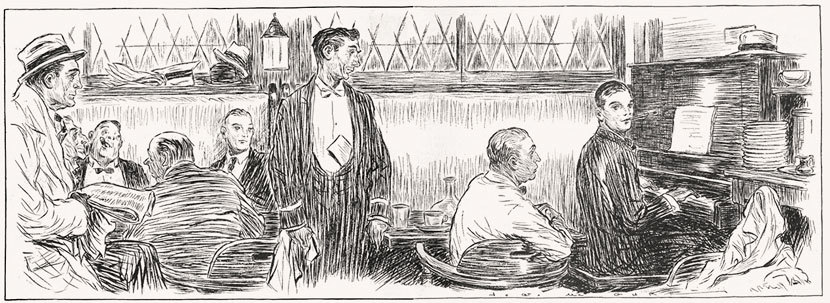Ring Lardner (1885–1933)
From Ring Lardner: Stories & Other Writings

“Perhaps the chief reason Ring Lardner is so little read these days is that he never wrote a novel,” biographer Jonathan Yardley wrote nearly forty years ago. “From Hawthorne to Faulkner, the most important American writers may have written stories, but their reputations rest on their longer works.”
Two of his books—You Know Me Al and The Big Town—have been (deceptively) sold by publishers as if they were novels, but they were really collections of magazine stories on (respectively) a slang-spewing baseball player and a young Midwestern couple transplanted to New York. In fact, Lardner had little interest in writing a novel. “It seems that the Scribner boys,” Lardner wrote, “have asked me time and again (that makes twice) to give them a full-length novel or book on one subject, but I kept refusing on the ground that I couldn’t think of a subject that I could stretch into a novel or book.”
“I wish there were something I could do to compel you to write that 40,000-word story, or novel, or whatever it ought to be called,” his editor, Maxwell Perkins, pleaded. “I do not know of any publishing news that would be more interesting than that such a book by you was to come out.” The critic Edmund Wilson wondered in print: “Will Ring Lardner, then, go on to his Huckleberry Finn? What bell might not Lardner ring if he set out to give us the works?” His close friend F. Scott Fitzgerald wrote in frustration to Perkins, “God, I wish he’d write a more or less personal novel. Couldn’t you persuade him? Think how far Anita Loos got with a mere imitation of him,” a reference to her novel Gentlemen Prefer Blondes.
“Lardner could also have said,” Yardley concluded, “that his mind functioned best over short, intense distances and that he did not think he was capable of writing a good novel—which in fact he probably was not. He was a master of the miniature, with a working method best suited to it.” And so he is remembered for his sportswriting and for a number of short stories that are masterpieces of satire. We present one of them as our Story of the Week selection: “Rhythm,” a mocking portrait of a songwriter who (as we explain in the introduction) reminded many of its readers at the time of George Gershwin.



